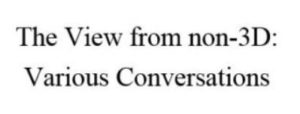
Monday, July 25, 2011
8 AM. I just wrote Maureen Caudill that what we call the physical and nonphysical are actually two parts of one thing, and can’t be understood separately. Dr. Jung, that’s why psychology hasn’t progressed farther, isn’t it?
You may go much further than that. It is why civilization has developed so many non-communicating specialties. It isn’t the potential for friction that holds them apart, but the lack of any adequate – or even inadequate! – common language, any coupling device. So sociology rarely talks to psychology, let alone religion or mythology or history, let alone physics or medicine or – or any of the other hard or soft sciences. It is more likely to communicate with architecture, and indeed the two disciplines could inform each other.
You have found, or been given, the unifying concept. Physical and non-physical are part of the same larger reality. When this is understood not as a pretty idea or as a metaphor but as a commonsense fact of life like a electromagnetism, life may again begin to come together.
Now, you must not suppose that everyone is going to embrace this idea. But a good continuation – I do not say a start – may be made. First the ideal must be put out there, then in time implementation will follow.
“Thank God I am Jung and not a Jungian,” I used to say. You will come to understand that, for any compelling idea, especially if it is breathtaking but not obviously applicable, is going to inflate the image of the person presenting it. See that it does not inflate the person himself!
I’ll settle for putting the idea out there.
That is all that is required, and all you are qualified to do. Let those with the specialized skills needed, and the combinations of skills, proceed to provide the demonstrations, learning for themselves what is or isn’t so. Acting as town crier is a specialty in itself, and involves personality traits not universally shared.
What could we look for if the various sciences and arts accepted the premise that reality is all one thing?
In the first place, that isn’t how they would see it. They will approach any particular facet of the problem from wherever they are, as, for instance, medicine first spawned, then uneasily coexisted with, and finally embraced, psychiatry, even though neither side of that particular relationship is really comfortable with its partner. That is one reason why so much of psychiatry is dealing heavily with pharmaceuticals. It isn’t simply monetary corruption; there is a philosophical basis to relying upon physical substances to alter somewhat predictably the physical substance that is all that either half of the marriage considers.
At this early point, any portion of medicine that begins to deal with nonphysical aspects of reality tends to see things through the metaphor of manipulation of matter. How is a mood or an altered state induced or influenced by a given chemical, either endogenous or introduced? Those who begin to see it in ways other than physical chemistry may at first look for another non-chemical or only partly-chemical cause, and in so doing feel themselves on the fringes of respectability, yet their standing-place is not so far removed from their more conventionally minded associates.
A reorientation is a way in the future; yet its roots, and certain shoots, so to speak, are already in evidence and will become more obvious in retrospect.